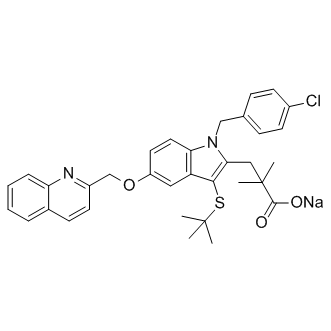
MK-591
CAS No. 147030-01-1
MK-591( Quiflapon sodium | MK-0591 | L-686708 )
Catalog No. M12014 CAS No. 147030-01-1
A potent, orally active leukotriene biosynthesis inhibitor that acts by inhibiting 5-lipoxygenase activating protein (FLAP) with IC50 of 1.6 nM in a FLAP binding assay.
Purity : >98% (HPLC)
 COA
COA
 Datasheet
Datasheet
 HNMR
HNMR
 HPLC
HPLC
 MSDS
MSDS
 Handing Instructions
Handing Instructions
| Size | Price / USD | Stock | Quantity |
| 50MG | 672 | Get Quote |


|
| 100MG | 896 | Get Quote |


|
| 200MG | Get Quote | Get Quote |


|
| 500MG | Get Quote | Get Quote |


|
| 1G | Get Quote | Get Quote |


|
Biological Information
-
Product NameMK-591
-
NoteResearch use only, not for human use.
-
Brief DescriptionA potent, orally active leukotriene biosynthesis inhibitor that acts by inhibiting 5-lipoxygenase activating protein (FLAP) with IC50 of 1.6 nM in a FLAP binding assay.
-
DescriptionA potent, orally active leukotriene biosynthesis inhibitor that acts by inhibiting 5-lipoxygenase activating protein (FLAP) with IC50 of 1.6 nM in a FLAP binding assay; inhibits leukotriene (LT) biosynthesis in intact human and elicited rat PMNLs with IC50 of 3.1 nM and 6.1 nM, respectively; inhibits the systemic generation of peptidoleukotrienes as measured by urinary LTE4 excretion in dogs (ED50=1 mg/kg).Asthma Phase 1 Discontinued.
-
In VitroQuiflapon sodium (MK591) and SB203580 are able to block SEB-induced human PBMC cell proliferation. Quiflapon sodium (MK591) down regulates three genes [for cathepsin L, IL-17 and guanylate binding protein (GBP)-2] that are up regulated by SEB. Quiflapon sodium (MK591) undergoes apoptosis within hours of treatment. Quiflapon sodium also induces rapid activation of the stress kinase, c-Jun N-terminal kinase (JNK), which plays an important role in the apoptosis process. Quiflapon sodium triggers apoptosis in prostate cancer cells without inhibition of PI3K-Akt, or ERK. Moreover, Quiflapon sodium and LY294002 exert synergistic effect in inducing apoptosis in prostate cancer cells. Quiflapon sodium (MK591) influences cAMP response element-binding protein but not Sp1.
-
In VivoHyperoxia groups of mice treated with Quiflapon sodium (MK591) (20, 40 mg/kg) show alveolarization that resembles that of room air controls while untreated hyperoxia groups show definite evidence of aberrant alveolarization but no inflammation. Comparison of the Aβ-immunopositive areas between the placebo and Quiflapon sodium (MK591) (320 mg/kg)-treated group reveals a statistically significant reduction of the amyloid burden in the treated mice. Quiflapon sodium also has a significant reduction in brain levels of IL-1β. Mice treated with Quiflapon sodium show a statistically significant decrease in the steady-state levels of total CREB and its phosphorylated form at Ser133.
-
SynonymsQuiflapon sodium | MK-0591 | L-686708
-
PathwayImmunology/Inflammation
-
TargetFLAP
-
RecptorFLAP
-
Research AreaInflammation/Immunology
-
IndicationAsthma
Chemical Information
-
CAS Number147030-01-1
-
Formula Weight609.1531
-
Molecular FormulaC34H34ClN2NaO3S
-
Purity>98% (HPLC)
-
Solubility10 mM in DMSO
-
SMILESCC(C)(C)SC1=C(N(C2=C1C=C(C=C2)OCC3=NC4=CC=CC=C4C=C3)CC5=CC=C(C=C5)Cl)CC(C)(C)C(=O)[O-].[Na+]
-
Chemical Name1H-Indole-2-propanoic acid, 1-[(4-chlorophenyl)methyl]-3-[(1,1-dimethylethyl)thio]-α,α-dimethyl-5-(2-quinolinylmethoxy)-, sodium salt (1:1)
Shipping & Storage Information
-
Storage(-20℃)
-
ShippingWith Ice Pack
-
Stability≥ 2 years
Reference
1. Brideau C, et al. Can J Physiol Pharmacol. 1992 Jun;70(6):799-807.
2. Ménard L, et al. Can J Physiol Pharmacol. 1992 Jun;70(6):808-13.
3. Tagari P, et al. J Pharmacol Exp Ther. 1993 Apr;265(1):416-25.
molnova catalog



related products
-
MK-0591
A potent, specific and orally active 5-Lipoxygenase-activating protein (FLAP) inhibitor with IC50 of 1.6 nM in FLAP binding assay.
-
GSK2190915
A potent, selective FLAP inhibitor with binding IC50 of 2.6 nM.
-
AM103
AM103 is an effective and selective inhibitor of FLAP (IC50 = 4.2 nM).



 Cart
Cart
 sales@molnova.com
sales@molnova.com


